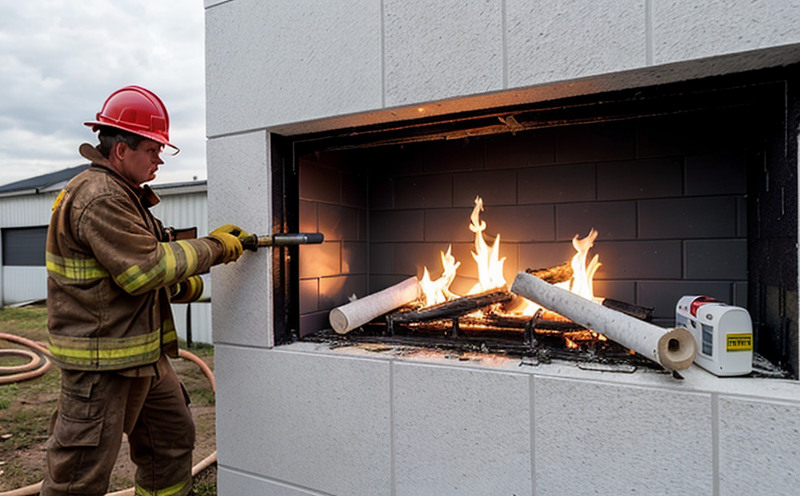Fire Resistance of Acoustic Panels
The fire resistance of acoustic panels is a critical aspect in ensuring safety and compliance within various sectors including commercial buildings, healthcare facilities, schools, and public spaces. Acoustic panels are designed to enhance sound absorption while simultaneously meeting strict fire safety standards. This section focuses on the testing methods employed by Eurolab for assessing the fire resistance of these materials.
The testing involves subjecting acoustic panels to controlled environments that replicate real-world conditions under which they might be exposed to fire. The primary goal is to determine how well the material can withstand ignition and resist spreading flames, thereby protecting occupants from potential hazards. According to ISO 1717:2013, this standard outlines procedures for determining flame spread on building materials and products.
During testing, samples are prepared according to specific dimensions laid out in the relevant standards such as EN 456-1 which specifies the test method for fire resistance of building components. The specimens are then placed into a furnace where they are exposed to temperatures ranging from approximately 700°C up to 900°C depending on the standard being followed. This high temperature simulates conditions that might be encountered during a fire event.
The duration of exposure is typically between 30 minutes and several hours, depending on the expected performance level required by building codes or client specifications. Throughout this period, detailed observations are made regarding any flaming, glowing embers, smoke production, and structural integrity maintenance. Compliance with these criteria ensures that the acoustic panels not only perform their intended function but also contribute positively towards overall fire safety.
The results of such tests provide essential information for architects, engineers, and designers when specifying suitable materials for new constructions or renovations. By understanding how different types of acoustic panels behave under fire conditions, decision-makers can select products that meet both acoustical performance goals and stringent fire code requirements.
Understanding the importance of fire resistance testing in acoustic panels is crucial given our increasingly urbanized world where public spaces are becoming more crowded with people. Ensuring proper installation and selection of materials helps mitigate risks associated with potential fires, ultimately enhancing safety for everyone involved.
Benefits
Ensuring the fire resistance of acoustic panels brings numerous benefits that extend beyond mere compliance with regulations. One significant advantage is improved occupant safety during emergencies such as fires or other evacuations. By selecting materials proven to resist ignition and prevent rapid spread, occupants are provided with a safer environment which can significantly reduce injuries and fatalities.
Another benefit lies in the enhancement of reputation among clients who value sustainability and safety above all else. Specifying fire-resistant acoustic panels demonstrates commitment not only to meeting local standards but also international best practices like those found in ISO 1717:2013 or ASTM E84-19a.
Additionally, there are financial advantages associated with using these materials. While initial costs may be higher than non-fire-resistant alternatives, long-term savings can be realized through reduced insurance premiums due to lower risk profiles and potential avoidance of costly remediation efforts following incidents involving compromised fire protection systems.
Finally, adhering to strict testing protocols for fire resistance helps establish trust between stakeholders involved in projects. Architects, engineers, contractors, and end users all benefit from knowing that the chosen materials have been rigorously evaluated against recognized standards, ensuring confidence in their performance during actual emergencies.
Eurolab Advantages
Eurolab stands out as a leader in providing comprehensive fire resistance testing services for acoustic panels. Our state-of-the-art facilities are equipped with advanced equipment capable of replicating real-world scenarios, ensuring accurate and reliable results every time.
We employ highly skilled technicians who possess extensive experience in conducting these types of tests. They stay updated on the latest developments within the industry and adhere strictly to international standards such as ISO 1717:2013 when performing evaluations. This ensures consistency across all projects, regardless of location or complexity.
The expertise of our team extends far beyond just executing tests; we also offer valuable insights into best practices for material selection based on test outcomes. Our consultants work closely with clients throughout the process, offering guidance tailored specifically to their needs and objectives.
By choosing Eurolab, you gain access to a network of experts capable of delivering unparalleled service quality. Whether you need assistance with sample preparation, interpretation of results, or simply seeking advice on how best to incorporate fire-resistant acoustic panels into your project, our professionals are here to support you every step of the way.
Competitive Advantage and Market Impact
The ability to demonstrate robust fire resistance in acoustic panels provides significant competitive advantages for manufacturers and suppliers operating within this niche market. In an increasingly regulated environment where safety standards are becoming more stringent, companies that can prove compliance through rigorous testing hold a distinct advantage over their competitors.
From a strategic standpoint, investing in thorough testing not only satisfies regulatory requirements but also enhances brand reputation among consumers who prioritize product safety above other factors. By showcasing commitment to high-quality materials and processes, these businesses stand out as preferred suppliers for discerning buyers looking to make informed decisions about the products they purchase.
On a broader scale, the widespread adoption of fire-resistant acoustic panels contributes positively towards improving public health outcomes globally. As urbanization continues to accelerate, so too does the need for safer environments in densely populated areas where even small improvements can have wide-reaching impacts.
The success stories of companies that have embraced this approach serve as inspiration for others seeking to enter or expand within this sector. They illustrate how integrating fire-resistant acoustic panels into designs can lead to increased market share, greater customer satisfaction, and ultimately stronger business performance overall.





